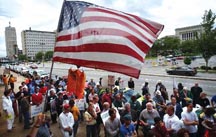Massachusetts’ workers are facing a multitude of daunting problems. Globalization, the intensification of work, reorganization, and new technology are a few of the challenges that have impacted workers and their communities. In response to these events the UMB Labor Resource Center hosted a conversation, “Good Jobs Build Strong Communities,” on March 15.
Representatives of labor groups, community organizers and the academic community met in the fourth floor student lounge in Wheatley Hall to share their views and develop a progressive response.
The event brought together an array of people who are concerned with the wellbeing of the working people of Massachusetts. Representatives from Boston City Councilor Felix Aroyo’s office, Mass. Association of Community Organizations for Reform Now (ACORN), the American Federation of Labor-Congress of Industrial Organizations (AFL-CIO), the Mass. Urban League, Dorchester United for Peace and Justice, World -Ed, Viet Aid, the Fields Corner Vietnamese Community Center, and the painters’ district council were among the many participants.
Susan Moir, the Director of the Labor Resource Center opened the session with some examples of the changing nature of work. She pointed out that as the European work week is being pared down to thirty-two hours, the American worker’s week is steadily climbing to the fifty hour mark.
Moir said that as individuals it is “difficult to see beyond the problems of globalization.” She then offered her view that that “the public university should be to combat fatalism and despair. By providing space and time for people to think about the changing economy, the university can promote a pro-worker, pro-union agenda.”
A panel of speakers which consisted of Fausto DaRocha of the Brazilian Immigrant Center, Lisa Clauson of the Greater Boston Labor Council, and Carl Proper of UNITE-HERE, a group which represents textile and restaurant workers spoke to the audience about the relationship between good jobs and strong, healthy communities.
After presenting their views, the speakers fielded questions from the audience.
The conversation covered a wide range of topics. One topic that engendered a great deal of interest was what constitutes a good job in the year 2005. While pay rates and medical benefits were major concerns, participants in the conversation voiced concerns about the transient nature of work. Many of the conversation participants cited the cost of housing as detrimental to workers and the wellbeing of the communities they reside in.
The afternoon’s conversation also touched on many themes that impact the lives of Massachusetts workers and the communities they live in. The impact of trends such as the use of temporary or part-time workers, the impact of technology and globalization were all examined.
Boston City Councilor Chuck Turner touched on the subject of black and Latino youth unemployment. He then brought up the idea that American society could be reshaped to make full employment the norm.
Turner continued that this idea was quite popular in the not so distant past but has been largely forgotten. He also brought up the topic of organizing the unemployed for the purpose of demanding jobs with decent wages.
The afternoon of conversation ended on a positive note. Moir, when asked about globalization and its impact on the workers and communities of Massachusetts said,” We need to become a global society instead of a global economy. That society needs to value workers.”
The event was part of a series of events that include the upcoming “The Future of Work in Massachusetts” conference which will be held in the Campus Center on April 28. The conference will bring together labor and community leaders as well as staff and faculty of the University of Massachusetts Boston in order to investigate issues in the workplace economy and its impacts on the workers.





















































